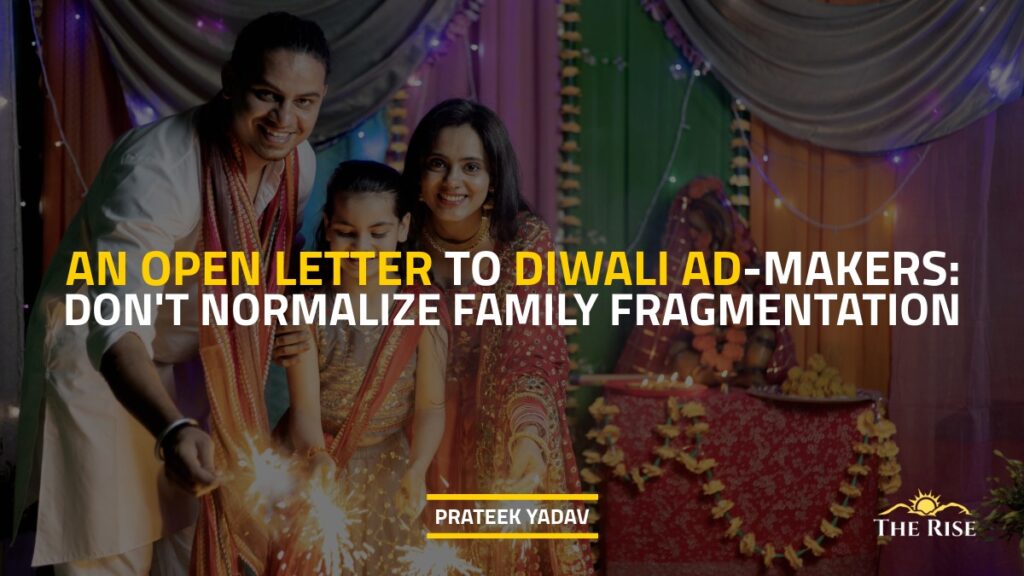When commodities like paints and sweets are glorified as replacements for the joy of children visiting their parents, the very essence of Diwali as an occasion of family get-together is diminished. Emotions get marketized. Employees’ commitment towards their employers during Diwali, at the cost of their families, is now being normalized. Where are the ads that encouraged compassionate buying of diyas from poor vendors? Where are the ads that romanticized people meeting each other in Diwali? Let’s not allow capitalism to guillotine our old Diwali.
Diwali is considered the most auspicious of all festivals in India. Its significance lies not just in its mythological basis, but also in the societal function it fulfills – that of rejuvenating the familial bonds. For the pre-2000s generation, Diwali wasn’t just a festival; it was an excitement marked by a year-long yearning to meet their extended family members. But amidst today’s forces of capitalism, urbanization, and consumerism, that may be up for a change.
In 2025, Diwali is just another festival, where work commitments overpower familial bonds. Children are unable to visit their parents, let alone meeting other family members, in this festival of reunion. Or at least, that is what the TV commercials portray.
The 2025 Birla Opus Paints Diwali ad depicts how the paints spread happiness amid the parents’ despair over their son’s inability to visit home in Diwali, thanks to his professional commitments. Quite similar to this plot is the Haldiram’s Diwali ad, which attempts to position Haldiram’s sweets as the answer to a gloomy Diwali in the absence of a parent-child Diwali reunion.
Artificial demand creation is often the lifeblood of ads. But this year’s Diwali ads go beyond it. This year’s ads are a deep reflection of how capitalism is changing our festival landscape. They not just commodify happiness, but also suck out the very essence of this auspicious festival.
When commodities like paints and sweets are glorified as replacements for the joy of children visiting their parents, the very essence of Diwali as an occasion of family get-together is diminished. Emotions get marketized. Commodities gain a mystical value much beyond their functional usage. Commodity fetishism gives way to a commodified Diwali. And, an auspicious Diwali gets sacrificed at the altar of a consumerist economy.
Another aspect of these ads is the subtle normalization of exploitative work culture. Michel Foucault’s theory of power talks about discourses as the modern methods of control. Remaining away from home, especially during festivals, has usually been a compulsion for the migrants rather than their desire. And migrants fuel today’s urbanized and globalized economies. But, if remaining away from home gets normalized as a discourse, the very longing for home during festivals becomes ‘abnormal’ and thus discouraged. Doesn’t this help the capitalist economies that are already facing recessionary threats today?
The works of Herbert Marcuse show how ads create an artificial culture in favour of capitalist exploitation. The plots of these Diwali ads do just that. Employees’ commitment towards their employers during Diwali, at the cost of their families, is now being normalized, if not glorified. It is not as if work must be relinquished for family endearment. In fact, the philosophies of Karm-yog and ‘work is worship’ lay great emphasis on work in one’s life. However, unlike these ads, these philosophies view work and family not as competing, but as complementary spheres of life.
Diwali is much more than a festival. It is the cultural core of Indian society. It is the unifying glue of India’s family system. It is the thread that weaves continuity into Indian civilization. Commodifying Diwali into a sales festival and glorifying family fragmentation in Diwali ads may serve a migrant-based consumerist economy, but does a great disservice to Indian society. A strong Indian family system is the foundation of a strong Indian society. But, the Diwali – one of the last remaining fortresses of Indian family system – is also now being attacked by the forces of commodity fetishism and capitalist discourses.
Ads don’t just create artificial demands; they also influence the social norms of the future. If Diwali ads with such subtle messaging become the norm, the Rams, the Laxmans, and the Sitas of Gen Z, Gen Alpha, and beyond may not be willing to visit back their Ayodhyas. If this festival of lights continues to be commodified, the emotion-lit diyas may well be replaced by emotionless flashlights in future homes. Diwali is uniquely Indian. Its values – of compassion, of victory of good over evil, of purity of love – propel us to aspire for Ram-Rajya. Where are the ads that glorified these values? Where are the ads that encouraged compassionate buying of diyas from poor vendors? Where are the ads that romanticized people meeting each other in Diwali?
Let’s not allow capitalism to guillotine our old Diwali. Let’s not allow Diwali ads to misrepresent the very essence of Diwali. Think about it!
Disclaimer: The views expressed in this article are those of the authors solely. TheRise.co.in neither endorses nor is responsible for them. Reproducing this content without permission is prohibited.

